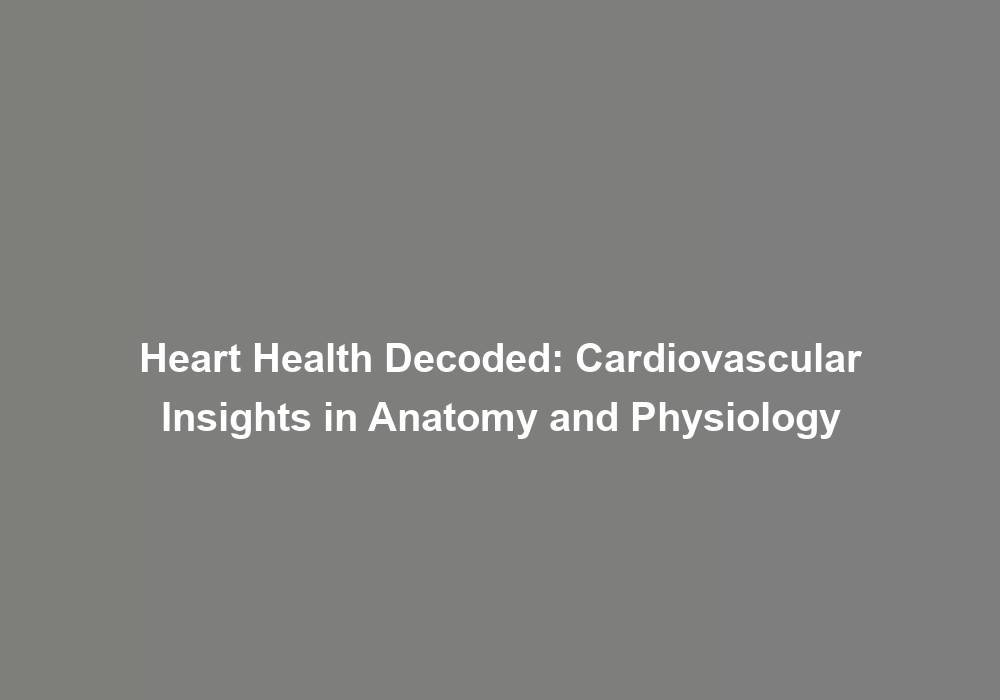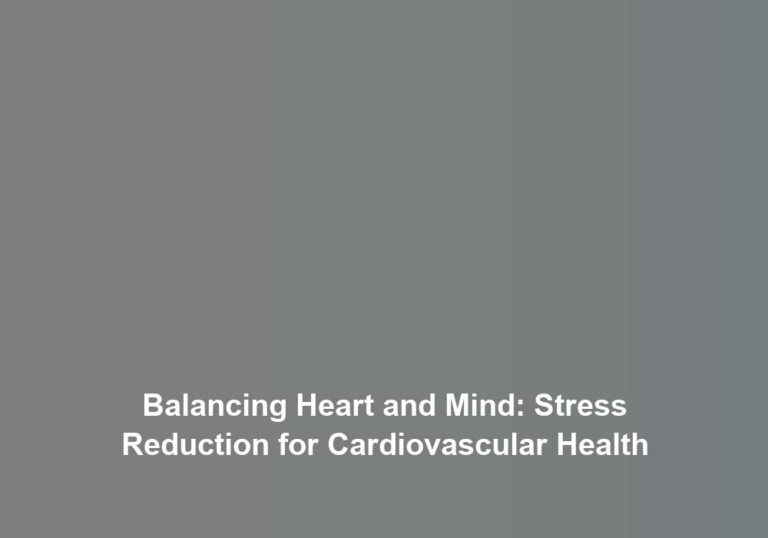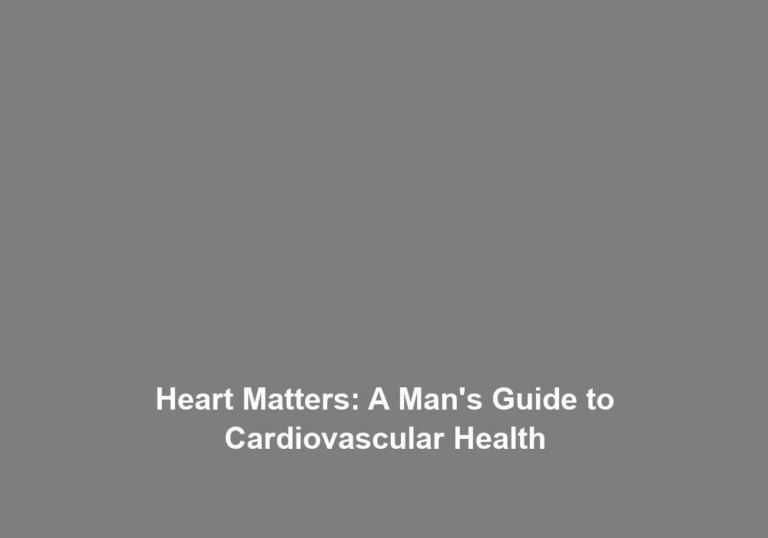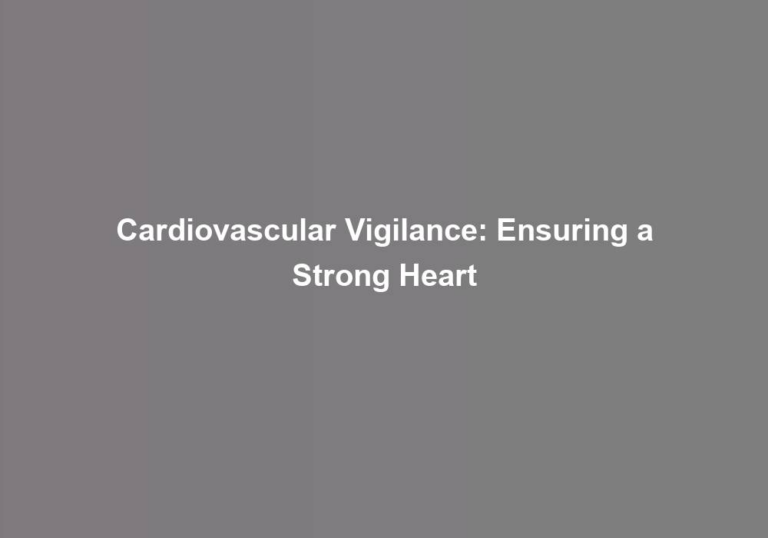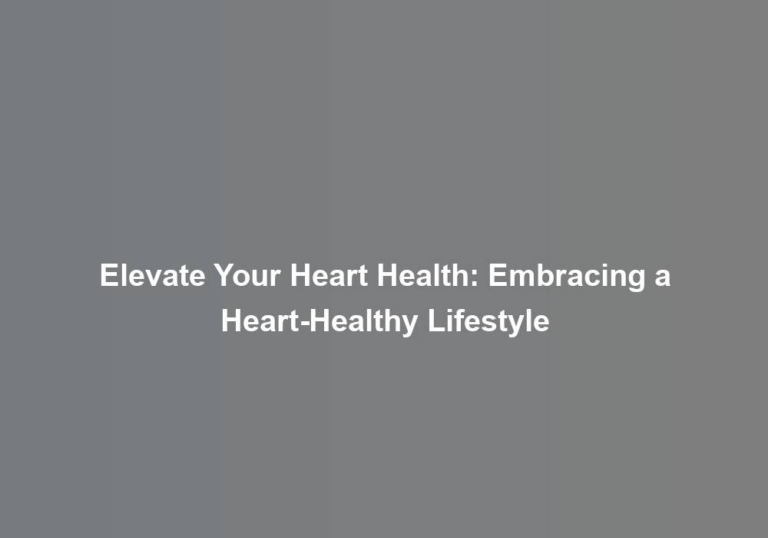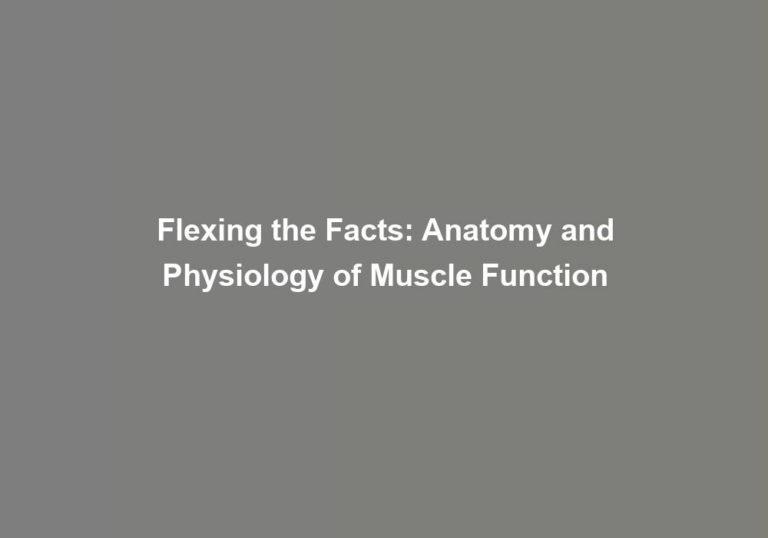Heart Health Decoded: Cardiovascular Insights in Anatomy and Physiology
You think you know a lot about the heart, but thereG??s so much more to uncover. Understanding the intricate workings of the cardiovascular system can provide valuable insights into maintaining a healthy heart. From the anatomy of the heart to the physiology of circulation, there are numerous factors that influence heart health. But itG??s not just about the basics G?? thereG??s a whole world of fascinating details waiting to be explored. Get ready to embark on a journey of discovery that will change the way you think about heart health.
The Anatomy of the Heart
The heart is a vital organ that pumps blood throughout your body, delivering essential nutrients and oxygen to your tissues and organs. Understanding the structure and function of your heart is crucial for maintaining overall health and well-being. The heartG??s structure is designed for its primary function: to pump blood. It is divided into four chambers – the left and right atria, and the left and right ventricles. These chambers work together to ensure that oxygen-rich blood is pumped to the rest of your body while simultaneously receiving oxygen-poor blood from your body and sending it to the lungs for oxygenation. The cardiac function is a coordinated process that involves the contraction and relaxation of the heart muscle, allowing it to efficiently pump blood. This rhythmic beating is controlled by electrical signals that originate in the heart itself. This intricate system ensures that your body receives the oxygen and nutrients it needs while also removing waste products. Understanding the structure and function of your heart can help you appreciate the amazing work it does for your body every day. By taking care of your heart through regular exercise, a healthy diet, and lifestyle choices, you can contribute to its well-being and ensure its continued optimal performance. Remember, your heart is the center of your bodyG??s cardiovascular system and taking care of it is essential for your overall health and vitality.
Understanding Cardiovascular Physiology
Understanding Cardiovascular Physiology involves delving into the intricate processes that govern the functioning of your heart and circulatory system, providing a deeper insight into how your body efficiently distributes oxygen and nutrients while removing waste products. It encompasses the understanding of the cardiac cycle, which involves the events of the heartG??s contraction and relaxation, leading to the flow of blood through the chambers. Additionally, comprehending blood flow dynamics aids in grasping how blood moves through the vessels, delivering essential substances to the bodyG??s tissues.
| Cardiac Cycle | Blood Flow Dynamics |
|---|---|
| Contraction of the heart muscle pushes blood out of the heart and into the arteries. | Blood flow dynamics involves the study of how blood moves through the circulatory system, taking into account factors such as pressure, resistance, and flow velocity. |
| Relaxation of the heart muscle allows the chambers to fill with blood from the veins. | It includes the understanding of how blood vessels regulate blood pressure and ensure an adequate supply of oxygen and nutrients to the bodyG??s organs and tissues. |
| The cardiac cycle is essential for maintaining blood circulation, ensuring that oxygenated blood reaches the bodyG??s tissues. | Understanding blood flow dynamics is crucial for comprehending the efficient distribution of nutrients and removal of waste products throughout the body. |
Understanding Cardiovascular Physiology not only provides insights into the intricate workings of your heart and circulatory system but also empowers you to make informed choices for maintaining a healthy cardiovascular system.
Factors Affecting Heart Health
To maintain a healthy cardiovascular system, you should be aware of various factors that can impact heart health. Two crucial aspects to consider are dietary habits and stress management. Your dietary habits play a significant role in heart health. Consuming a balanced diet that is rich in fruits, vegetables, whole grains, lean proteins, and healthy fats can positively impact your cardiovascular system. Limiting the intake of saturated fats, trans fats, cholesterol, and sodium is also essential. Additionally, managing your stress levels is crucial for maintaining a healthy heart. Chronic stress can lead to high blood pressure, irregular heart rhythms, and other cardiovascular issues. Finding effective ways to manage stress, such as practicing mindfulness, engaging in physical activity, or seeking support from friends and family, can significantly benefit your heart health. By incorporating these practices into your daily life, you can actively contribute to the well-being of your cardiovascular system. Remember, small changes in your dietary habits and stress management can lead to substantial improvements in your heart health. ItG??s important to prioritize these factors as part of your overall wellness routine.
Common Cardiovascular Disorders
Managing your stress levels is crucial for maintaining a healthy heart, as it is essential to recognize the potential risks and symptoms of common cardiovascular disorders. Being aware of these conditions can help you take proactive measures to prevent them and seek timely medical assistance if needed. Here is a table highlighting the common cardiovascular disorders, their symptoms, and preventive measures:
| Cardiovascular Disorder | Symptoms | Prevention |
|---|---|---|
| Heart Attack | Chest pain, shortness of breath, | Manage stress, eat a balanced diet, exercise regularly, |
| nausea, lightheadedness | avoid smoking and excessive alcohol consumption | |
| Stroke | Sudden numbness or weakness in the | Control blood pressure and cholesterol levels, maintain a |
| face, arm, or leg, confusion, trouble | healthy weight, exercise regularly, avoid smoking, and | |
| speaking, walking, or seeing | limit alcohol intake |
Understanding the signs and symptoms of a heart attack and stroke is crucial for seeking emergency medical help. Additionally, adopting a heart-healthy lifestyle, which includes regular exercise, a balanced diet, and stress management, can significantly reduce the risk of these cardiovascular disorders. By making these lifestyle changes, you can take proactive steps in preventing heart attacks and strokes, ultimately promoting a healthier and stronger heart.
Tips for Maintaining Heart Health
Improving your heart health can be achieved through simple yet impactful lifestyle choices. By paying attention to your dietary habits and exercise routines, you can significantly reduce the risk of cardiovascular issues. Here are some practical tips to help you maintain a healthy heart:
-
Balanced Diet: Incorporate plenty of fruits, vegetables, whole grains, and lean proteins into your meals. Limit your intake of processed foods, saturated fats, and sugary snacks.
-
Regular Physical Activity: Engage in at least 150 minutes of moderate-intensity aerobic activity or 75 minutes of vigorous-intensity aerobic activity each week. This can include brisk walking, swimming, or cycling.
-
Weight Management: Maintain a healthy weight to reduce the strain on your heart. Combine a nutritious diet with regular exercise to achieve and sustain a healthy weight.
-
Stress Management: Practice relaxation techniques such as deep breathing, meditation, or yoga to manage stress effectively. Chronic stress can negatively impact your heart health.
-
Regular Health Check-ups: Schedule regular visits with your healthcare provider to monitor your blood pressure, cholesterol levels, and overall heart health. Early detection and intervention can prevent potential issues.
Conclusion
So, now you know the ins and outs of heart health. DonG??t let the complexity overwhelm you. Remember, taking small steps like regular exercise and a balanced diet can make a big difference. And if youG??re worried about genetics playing a role in heart disease, keep in mind that lifestyle choices can still mitigate those risks. Your heart health is in your hands, so take charge and make those positive changes today.

